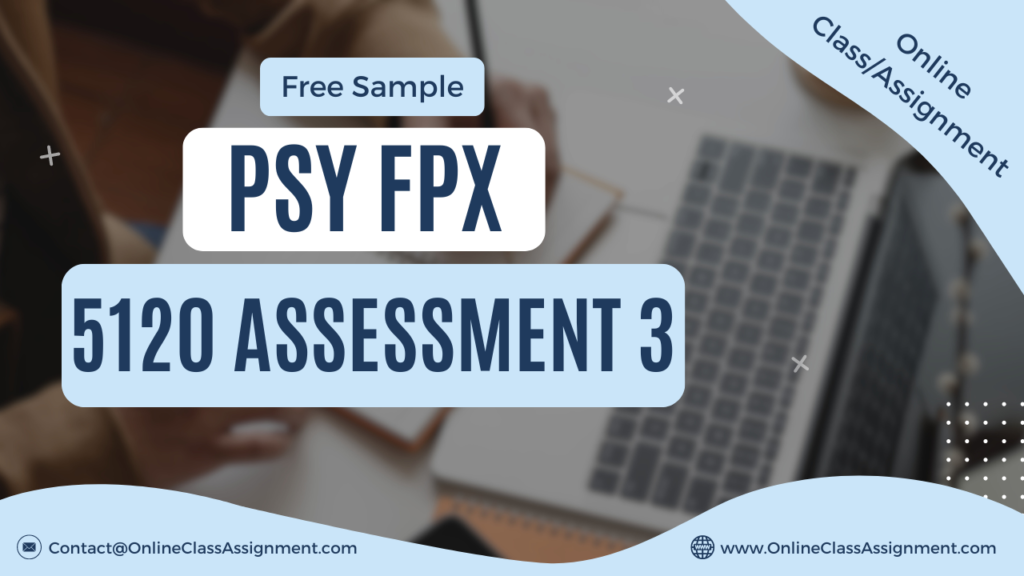
PSY FPX 5120 Assessment 3 Aggression Intervention Training
Student Name
Capella University
PSY FPX 5120 Social Psychology
Prof. Name
Date
Aggression Intervention Training in Educational Settings
Aggression prevailing in educational environments is a significant concern, necessitating all personnel to possess comprehension and effective responses. Heightened levels of aggression among students have been associated with diverse mental health challenges, thus posing a considerable risk to their social, mental, and physical well-being (Belden et al., 2012). It is noteworthy that the impact of aggression extends beyond individual students, influencing both peers and educators. Social interactions and relationships substantially shape children’s emotional responses and cognitive processes, thereby affecting their social information processing (Yaros et al., 2014). Environments characterized by hostility tend to foster hostile attributions, potentially leading to aggressive behaviors within classrooms (Yaros et al., 2014). Hence, it is imperative for educators to understand their own reactions and triggers, comprehend the self-concept of aggressors, and possess the skills necessary to manage aggressive incidents effectively.
Program Focus and Structure
The primary objective of this aggression intervention program is to equip educators with tools for cultivating positive social skills and mitigating classroom aggression. Social learning assumes a crucial role, where educators serve as role models to deter aggression and encourage prosocial behavior (Swit et al., 2018). The program is structured as a 2.5-hour session, encompassing the following components:
- Pre-Test
- Framing the Importance of Aggression Intervention Strategies
- Defining Goals and Objectives
- Aggressive Intervention Strategies (including interactive demonstrations)
- Post Test
- Recommendations for the Future
Goals and Objectives
The program aims to achieve the following objectives:
- Enhance staff awareness of their reactions and triggers.
- Enable staff to swiftly assess the self-concept of aggressors.
- Equip staff with a repertoire of techniques to de-escalate aggressive situations.
- Facilitate ongoing professional development for staff in aggression intervention.
- Foster a safe and inclusive educational environment for both staff and students.
Interventions
Effective interventions to mitigate aggression encompass neutral redirection, cognitive reappraisal, and preventive measures.
Neutral Redirection Intervention
Neutral redirection involves guiding children away from aggressive behavior without resorting to punitive measures (Austin, 2023). For instance, instead of admonishing a student for physically harming peers, teachers can redirect them to utilize verbal communication to express their needs effectively.
Cognitive Reappraisal Intervention
Cognitive reappraisal entails recognizing and re-evaluating negative thoughts to regulate emotions and responses (Denson, 2015). It promotes mindfulness, encourages problem-solving, and enhances self-esteem (Field et al., 2014).
Preventive Measures
Timely praise, engaging classroom activities, and understanding student preferences are crucial preventive measures (Austin, 2023). These strategies cultivate positive behaviors and minimize frustration, thereby reducing the likelihood of aggression.
Social Self-Concept
Educators’ understanding of their social self-concept profoundly influences their ability to manage aggression effectively (Swit et al., 2018). By demonstrating positive social skills, teachers contribute to a supportive classroom environment conducive to conflict resolution and social development.
Evaluation
The ATAS scale, assessing attitudes toward aggression, encompasses various components such as offensive attitude and communicative attitude (Olabisi et al., 2020). Pre- and post-tests utilizing this scale serve to evaluate the effectiveness of the intervention.
PSY FPX 5120 Assessment 3 Aggression Intervention Training
Recommendations
Upon completion of the training, educators should undergo a post-test and acknowledge the necessity of ongoing training to reinforce intervention strategies.
References
Austin, C. (2023, April 20). Intervention strategies for aggression: Hitting. Special Learning. https://speciallearning.com/blog/intervention-strategies-for-aggression-hitting/
Belden, A. C., Gaffrey, M. S., & Luby, J. L. (2012). Relational aggression in children with preschool-onset psychiatric disorders. Journal of the American Academy of Child & Adolescent Psychiatry, 51(9), 889–901.
Denson, T. F. (2015). Four promising psychological interventions for reducing reactive aggression. Current Opinion in Behavioral Sciences, 3, 136–141. https://doi.org/10.1016/j.cobeha.2015.04.003
Field, R. D., Tobin, R. M., & Reese-Weber, M. (2014). Agreeableness, social self-efficacy, and conflict resolution strategies. Journal of Individual Differences, 35(2), 95–102.
Olabisi, O., Lawal, A., Ajao, O., Adeolu, E., & Oriola, O. (2020). Experience and attitude of psychiatric nurses toward inpatient aggression in a Nigerian psychiatric hospital.
Salimi, N., Karimi-Shahanjarini, A., Rezapur-Shahkolai, F., Hamzeh, B., Roshanaei, G., & Babamiri, M. (2019). Aggression and its predictors among elementary students. Journal of Injury & Violence Research, 11(2), 159–170. https://doi.org/10.5249/jivr.v11i2.1102
Swit, C. S., McMaugh, A. L., & Warburton, W. A. (2018). Teacher and parent perceptions of relational and physical aggression during early childhood. Journal of Child and Family Studies, 27(1), 118–130. https://doi.org/10.1007/s10826-017-0861-y
PSY FPX 5120 Assessment 3 Aggression Intervention Training
Yaros, A., Lochman, J. E., Rosenbaum, J., & Jimenez‐Camargo, L. A. (2014). Real‐time hostile attribution measurement and aggression in children. Aggressive Behavior, 40(5), 409–420.
Get Capella University Free MS Psychology Samples
PSY FPX 5002
PSY FPX 6710
PSY FPX 5110
PSY FPX 6720
PSY FPX 6730
PSY FPX 6740
PSY FPX 7610
PSY FPX 6O15
